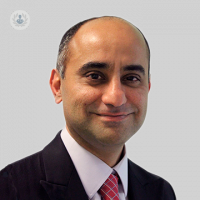Breast lumps: are they always a cause for concern?
Written by:According to Cancer Research UK, there are around 55,000 new breast cancer cases in the UK every year, approximately 150 every day. We recently spoke with a leading consultant breast and oncoplastic surgeon, Mr Haresh Devalia, to find out whether breast lumps are always a cause for concern and how they can be detected.

What are the causes of breast lumps?
Common causes of a benign breast lump is a fibroadenoma. In menopausal women, it is the commonest breast cyst. It’s a tumour formed of mixed glandular and fibrous tissue, typically occurring as a benign growth in the breast.
Breast lumps are not always serious but one has to be suspicious of breast cancer in everyone, it needs to be ruled out in each case. When a breast examination is carried out we check for fibroadenoma, breast cysts, and breast cancer.
How can breast lumps be detected?
Breast lumps can be detected by clinical examination and by regularly examining the breasts at home. It is important to check all areas of the breast including the nipple area, up to the armpit and to the collar bone.
In what part of the breast are lumps usually found?
Breast lumps can be found in any part of the breast. However, it’s extremely common to find them in the upper outer quadrant of the breast and the second common side is behind the nipple.
Do breast lumps always require removal?
Most benign lumps can be left alone as long as they are proved benign on biopsy. Any benign lump which increases in size, is indeterminate on biopsy or shows atypical cells on histology would require surgery. Some symptomatic benign lumps would require surgery, most breast cancer patients will need surgery as a treatment plan.
Are breast lumps always painful?
Most breast cancer lumps are painless, and most painful lumps are likely to be benign cysts. However, all lumps require triple assessment in a one-stop breast clinic (clinical examination, imaging i.e. mammogram or ultrasound, plus or minus biopsy).
When should I be concerned about a breast lump?
Most lumps are benign, however, the lumps in post-menopausal women should always be thoroughly investigated as more than 60% of them are because of cancer. Any lump associated with nipple retraction and/or skin retraction is suspicious until proven otherwise. Breast lumps around the armpit definitely require further investigation and any lump which keeps on increasing in size will also require thorough triple assessment.
If you feel you may have a breast lump, we strongly recommend booking a consultation with Mr Haresh Devalia via his Top Doctor’s profile.


